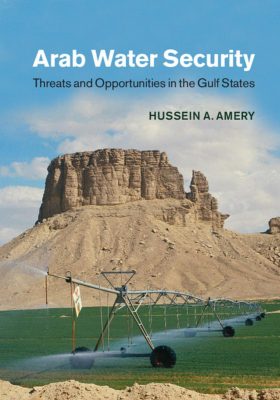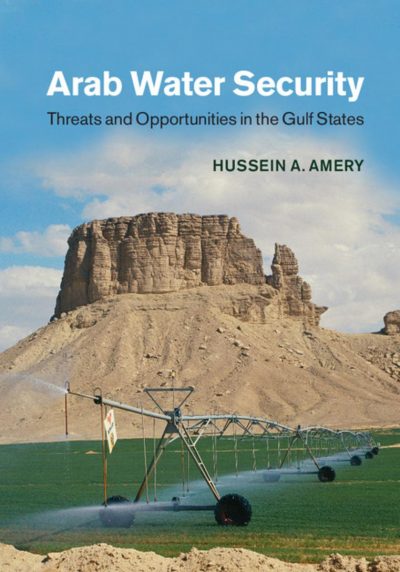 Author: Hussein A. Amery, PhD
Author: Hussein A. Amery, PhD
Publisher: Cambridge University Press – 162 pages
Book Review by: Sonu Chandiram
The Arab world, from Iraq to Egypt and all the way to Morocco, is one of the most arid regions on the planet. Within this large area are the Gulf States that include Bahrain, Iraq, Kuwait, Oman, Qatar, Saudi Arabia, the United Arab Emirates (UAE), and Yemen. They are part of the geopolitical sub-region known as the Gulf Cooperation Council (GCC).
Why is water scarce in the Middle East? It is because agriculture uses 85 percent of water in the region. In this part of the world droughts are more frequent, and contribute to the changing landscape. The overuse of water in agriculture is affecting the countries’ already undersized water resources.
Alexandra Barton, a guest writer for the website The Water Project states in her article Water in Crisis – Middle East states: “the Middle East has experienced many environmental concerns lately. Water resources are becoming increasingly scarce, especially for the millions there who already lack access to sanitary water.”
“Some of these countries, including Yemen, the United Arab Emirates, Saudi Arabia, and Iraq, are facing unique problems that require global, immediate attention. Besides their neighboring location , one shared factor of all these countries is their lack of water resources and poor water management.”
The Arab states critically require continued access to a secure supply of freshwater, and have a growing dependence on large desalination plants. The threats to water security (including threats from terrorists) “are a real and pressing concern,” the author Dr. Hussein Amery points out.
Among other purposes, the author Hussein A. Amery states that this book was written to:
- Explore the national security implications on the Arab Gulf states’ reliance on desalination plants and related infrastructure
- Provide the first systematic and comprehensive discussion and future threats to the supply of freshwater from a desalination plant, including actual and virtual threats by terrorists, mechanical failure, contamination, sabotage by aggrieved workers, and attacks relating to regional conflicts as well as their vulnerability to natural disasters
- Provide a detailed analysis of the effects of a potential disruption to the water supply
- Propose possible measures, both political and technological, that can be sued to increase resilience to these threats
To accomplish these goals, Dr. Amery has written this book with the following outline of contents in it, including the titles of its five chapters:
List of Figures
List of Tables
Preface
- Rethinking water and food security in the Arab Gulf states
- Threats to water security
- Outsourcing farming
- Responses to water insecurity
- The future of water and food security
Among the types of people who will find this book useful are:
- Graduate students
- Policymakers and professionals
- Researchers
- Those interested in countermeasures to environmental terrorism, natural resources, and water security
This is a very useful book essential to understanding one of the most scarce and important resources in the Arab world: water. Being in short supply, ample potable water derived from desalination plants is essential to human survival. Moreover water derived from rivers and other sources are essential for agriculture and economic development in the Middle East.
Reading this book and realizing the importance of water and food security is key to understanding the whole of the Middle East and its sociopolitical and economic problems and geopolitical situation.
Author:
Hussein A. Amery, PhD is an Associate Professor in the Division of Liberal Arts at International Studies at the Colorado School of Mines, where he teaches courses on the political economy of resources, the Middle East, and on water politics and policy.
His academic expertise is in human and environmental security, trans-boundary water conflicts, and in analyzing and identifying threats to the critical infrastructure in the Arab Gulf states and the wider Middle East.
He was selected as Fellow by the International Water Association in 2005, and has served as consultant on desalination and other water issues to the American and Canadian governments, as well as engineering firms.







